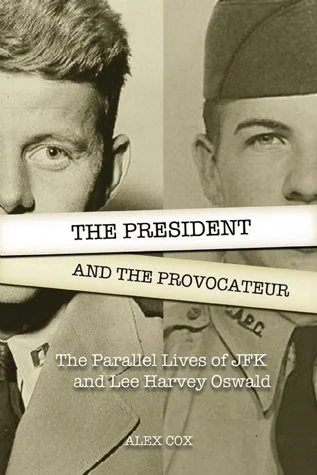As the 50th anniversary of John Kennedy’s assassination approaches, battle lines are being drawn. On one side, the official, Oswald-did-it version of history is trotted out in establishment-sided books like Bill O’Reilly’s numbskull Killing Kennedy and an upcoming hardcover from LIFE called The Day Kennedy Died. Given the suspect role LIFE itself played in the story, the latter should offer grim amusement to the legion of independent researchers fighting for truth in the opposite camp. The Zapruder film was purchased by the magazine immediately after Kennedy was slaughtered, whereupon it was kept from public view for over 10 years. In the midst of this, LIFE would mislead readers by publishing key frames from the film—reversed!
This one small detail goes uncovered in The President and the Provocateur: The Parallel Lives of JFK and Lee Harvey Oswald, but author Alex Cox clearly knows his stuff. Absent any original research, it’s good to see key latter-day works cited like John Newman’s Oswald and the CIA. Cox also pulls from John Armstrong’s monolithic 10-year study, Harvey and Lee, which demonstrates rather conclusively that the construct known as Lee Harvey Oswald spent much of his life—or lives—in two places at once, even as a child. Cox takes the common view (unless you’re Bill O’Reilly) that Oswald was almost certainly a government agent and false defector, later sent to infiltrate and discredit left-wing groups while keeping tabs on the bizarre right-wing extremists he hooked up with in New Orleans. He allows that the FBI informant known to history only as “Lee”, who scuppered an almost identical plot to kill Kennedy in Chicago, patsy included, was very possibly Oswald himself.
Along with an arguably over-critical view of Kennedy’s presidency, this and more are all covered in a sometimes too-brisk but nutritious 290 pages. Cox also conjures a vivid picture of the violent hate gripping America’s militia-minded right wing at the time, even breaking the narrative at one point to pen a chapter on the shooting of Congressperson Gabrielle Giffords, which occurred while he was working on the book in 2011. This focus on American extremism isn’t unexpected if you’re familiar with Cox as the dissident, émigré filmmaker behind Repo Man and Walker. (Assuming you’ve heard him speak, Cox’s exceedingly dry humour really works if you read The President and the Provocateur in his slightly pedagogic, transatlantic voice.) If some Kennedy obsessives will inevitably depart from the personal view Cox lays out in the last chapter, it’s nonetheless fascinating to learn how his lifelong interest began as a 15-year-old in the U.K.—back when Warren Commission skepticism was a little more fashionable.
Meanwhile, few would argue with his conclusion that a citizen-led Truth Commission is still desperately needed after all this time, and that it should investigate not just Kennedy, but the “whole imperial deal”, including “who profits from the drug trade” and “what took place on September 11, 2001”. No argument there, Alex.
Georgia Straight, July 2013
